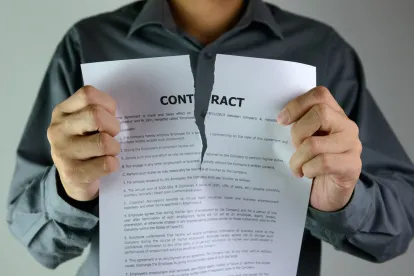With increasingly onerous governmental restrictions on business and individuals, companies may face shortages of workforce and supplies. In turn, many companies are facing the reality of the inability to perform on their contracts. While a previous Legal Update covered the effects of pandemic on force majeure clauses, this Legal Update addresses some considerations to avoid performing under a contract without a force majeure provision. A party can be excused from performing under a contract in a variety of circumstances including without limitation (I) performance becoming impossible, (II) frustration of the contract’s purpose, and (III) subsequent action or inaction of the contract’s parties. Finally, we provide some considerations for companies going forward.
I. Impossibility
If performing under the contract becomes impossible due to unforeseeable events beyond the parties’ control, then a contract defense may exist. These supervening events may include a variety of causes from natural disasters and pandemics, to geo-political risks and acts of God. The impossibility defense has been unavailing where the nonperforming party’s own negligence caused the party not to know or expect the supervening events to make performance impossible. Also, some cases have held that, where performance is impossible due to merely temporary circumstances, performance may be excused only for as long as the impediment to performance exists. Parties attempting to assert an impossibility defense should take special precaution to document how and why performance became impossible.
II. Frustration of Purpose
If the parties can still perform under a contract, but external events not caused by the nonperforming party defeats the main intent or purpose of the contract, the parties will be excused from performance. For example, if a person contracted with a business for the right to sit in a window and watch a parade go by, but the parade is later cancelled, the contract’s purpose would be frustrated. The contract’s frustration must be substantial and caused by a change in fundamental assumptions on which the contract was made. Parties attempting to assert a frustration defense should take special precaution to document the original intent of the contract and why that intent has been fundamentally defeated by changed circumstances.
III. Subsequent Action or Inaction of the Parties
Regardless of whether a contract contains a force majeure provision or whether any common law defenses excuse performance, the parties to a contract can excuse performance by taking certain actions (or failing to act) after the contract is executed. For instance, the parties can sign a subsequent agreement excusing performance under the original contract. The subsequent agreement, assuming it is otherwise valid, should supersede the original contract. Another example is by failing to act in response to the other party’s breach. Generally, a party is expected to promptly notify the other party upon discovery of a breach. Failure to do so may constitute the non-breaching party’s waiver of strict performance and cause difficulties in later enforcing the contract or requiring strict performance.
Considerations During Pandemic
In light of the COVID-19 pandemic and the ensuing economic disruptions it has caused, businesses should carefully review their contractual obligations and take stock of their ability to meet these obligations. In anticipating a failure to perform, consider whether legal remedies are available such as asserting the contract has become impossible to perform or that the central purpose of the contract has been substantially frustrated. In lieu of these defenses, companies should be cognizant of more informal solutions such as negotiating an amendment with the other parties that will best accomplish the original contract’s purposes while accounting for the realities of changed circumstances. Engaging legal counsel early may help in interpreting the interplay of practical realities and contractual language as well as crafting effective communications to other parties to best mitigate risks.



 />i
/>i

